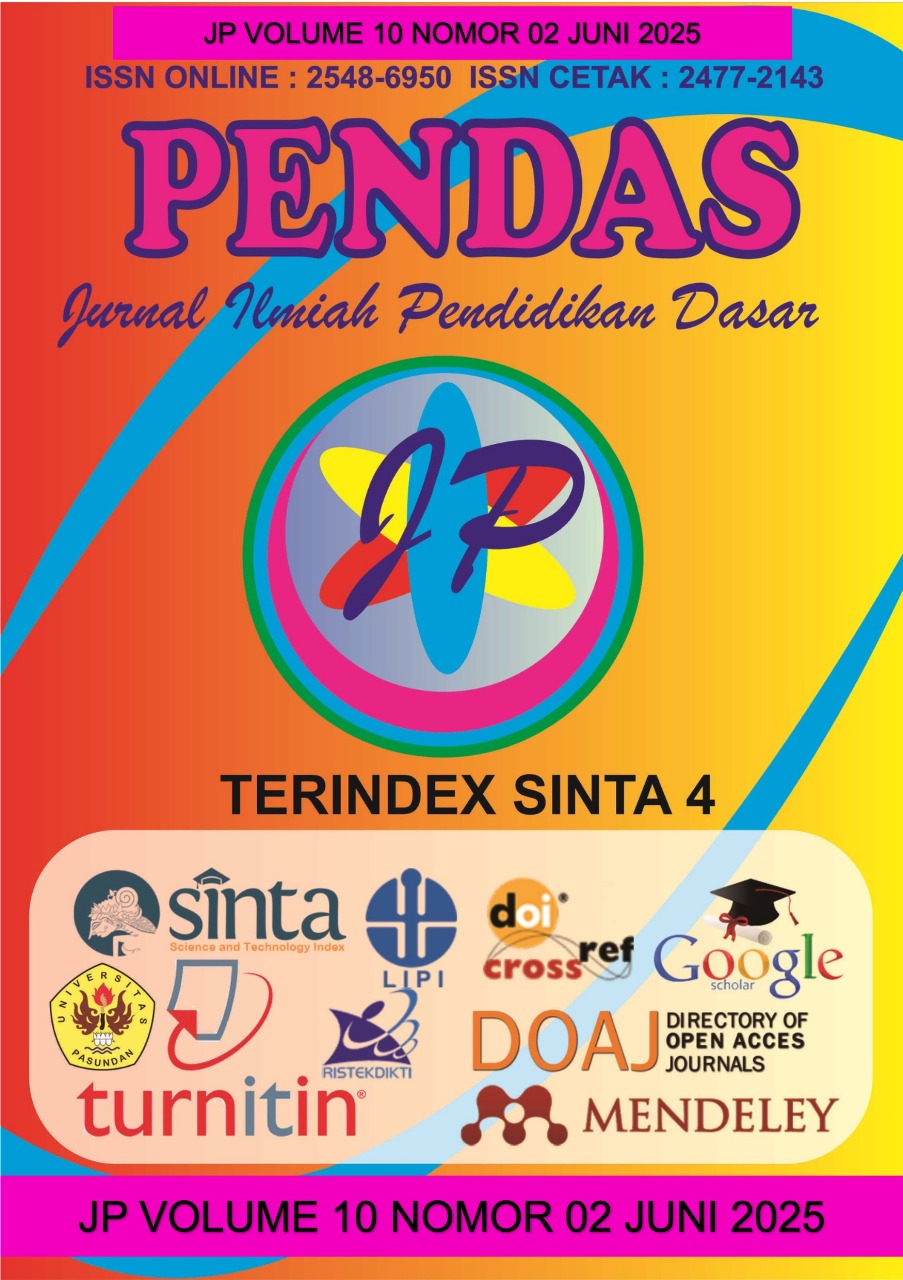KOLABORASI SEBAGAI STRATEGI PEMBELAJARAN MI : TINJAUAN LITERATUR TERHADAP MODEL JIGSAW, THINK PAIR SHARE (TPS), DAN GROUP INVESTIGATION (GI)
DOI:
https://doi.org/10.23969/jp.v10i2.30106Keywords:
Collaborative/Cooperative Learning, Jigsaw Model, Think Pair Share Model, Group Investigation ModelAbstract
Collaborative and cooperative learning are currently widely applied in modern education to increase student participation and academic achievement. This study adopts a literature review method by collecting and analyzing various sources, such as books, research reports, journals, and articles related to both learning approaches. One of the problems discussed in this article is the imbalance in participation between students and teachers, where students tend to be passive during learning, reducing the effectiveness of the learning process. In addition, in the 21st century, students are required to master collaborative skills in solving problems, making the participatory approach increasingly important. Before implementing the learning process, educators need to prepare a thorough plan in the form of a teaching module or Learning Implementation Plan (RPP) that includes various components of strategies, methods, and learning models. The learning strategy itself is a combination of three fundamental aspects: theoretical foundations (science), pedagogical innovation (art), and practical competence (skills) applied by teachers in guiding students, providing motivation, and creating an optimal learning atmosphere. In the contemporary education system, collaborative and cooperative approaches have developed as significant learning methods. Both models emphasize social interaction and cooperation between students in order to optimize conceptual understanding. This learning process is designed so that students can master the subject matter through mutually supportive group activities. Collaborative/cooperative models not only strengthen students' social interactions but also train communication and teamwork skills. This kind of approach is very suitable for application at the elementary education level (MI/SD). Based on the results of the analysis, the collaborative approach has proven effective in honing students' high-level thinking skills through interactive dialogue, while the cooperative method shows advantages in achieving learning targets in a more structured manner.
Downloads
References
Abdul, M. (2019). STRATEGI PEMBELAJARAN. PT. Remaja Rosdakarya. Bandung (BUKU)
Abdullah, R. (2017). The Effect of Applying the Jigsaw Cooperative Learning Model to Chemistry Subjects at Madrasah Aliyah (in Bahasa). Lantanida Journal, 5(1), 13.
Ahdar Djamaluddin, W. (2019). BELAJAR DAN PEMBELAJARAN 4 Pilar Peningkatan Kompetensi Pedagogis. In A. Syaddad (Ed.), New Scientist (Cetakan I, Vol. 162, Issue 2188). CV. Kaaffah Learning Center.
Ali, I. (2021). Pembelajaran Kooperatif (Cooperative Learning) Dalam Pengajaran Pendidikan Agama Islam. Jurnal Mubtadiin, 7(01), 247–264.
Amiruddin. (2019). Pembelajaran Kooperatif dan Kolaboratif. Journal of Educational Science (JES), 5(1), 24–32.
Azis, A. (2016). Peningkatan partisipasi dan prestasi belajar Matematika melalui pembelajaran kooperatif tipe TPS pada siswa SMP. Ekuivalen - Pendidikan Matematika, 20, 145–150.
Bintang wicaksono. (2017) Model Pembelajaran Group Investigation (Gi) Dan Think Pair Share (TPS) Terhadap Kemampuan Berpikir Kritis. Aksioma, 8(2).
Butar-Butar, W. Y., & Appulembang, O. D. (2023). Analisis Penggunaan Model Think Pair Share Untuk Membangun Partisipasi Siswa Dalam Pembelajaran Matematika Secara Daring. ELIPS: Jurnal Pendidikan Matematika, 4(1), 81–92.
Firmansyah, Arief, M., & Wonorahardjo, S. (2019). Penerapan Model Pembelajaran. Pai, 5(2), 87–92.
Hayaturraiyan, A. H. (2022). STRATEGI PEMBELAJARAN DI PENDIDIKAN DASAR KEWARGANAGARAAN MELALUI METODE ACTIVE LEARNING TIPE QUIZ TEAM. 2(1), 108–122.
Husain, R. (2020). PENERAPAN MODEL KOLABORATIF DALAM PEMBELAJARAN DI SEKOLAH DASAR. 2012, 12–21.
Khoiriyah, F., Yustitia, V., & Supratiwi, W. (2024). Pembelajaran Berdiferensiasi untuk Meningkatkan Pemecahan Masalah Matematika : Penelitian Tindakan Kelas di Sekolah Dasar. Journal Innovation in Education, 2(3), 353–358. https://doi.org/https://doi.org/10.59841/inoved.v2i3.1777
Lirnawati, E. T. (2016). Problematika Penerapan Pembelajaran Kooperatif Tipe Think Pair Share pada Pembelajaran Matematika dan Alternatif Pemecahannya. Konferensi Nasional Penelitian Matematika Dan Pembelajarannya (KNPMPM 1), 1, 624–630.
Mukhtar, M. (2023). Pembelajaran Kooperatif Dan Kolaboratif Perspektif Pendidikan Islam. Ameena Journal, 1, 162–174.
Nganga, L. (2019). Preservice teachers’ perceptions and preparedness to teach for global mindedness and social justice using collaboration, critical thinking, creativity and communication (4cs). Journal of Social Studies Education Research, 10(4), 26–57.
Nurhayati, I., Pramono, K. S. E., & Farida, A. (2024). Keterampilan 4C (Critical Thinking, Creativity, Communication And Collaboration) dalam Pembelajaran IPS untuk Menjawab Tantangan Abad 21. Jurnal Basicedu, 8(1), 36–43. https://doi.org/10.31004/basicedu.v8i1.6842
Pamungkas, D. P., Patonah, R., & Rohaeni, E. (2022). Analisis Metode Pembelajaran Connecting, Organizing, Reflecting, Extending (Core)Pada Mata Pelajaran Ekonomi. J-KIP (Jurnal Keguruan Dan Ilmu Pendidikan), 3(1), 201. https://doi.org/10.25157/j-kip.v3i1.6417
Pranata, E. (2016). Implementasi Model Pembelajaran Group Investigation ( GI ) Berbantuan Alat Peraga Untuk Meningkatkan Kemampuan Pemahaman Konsep Matematika. Jurnal Pendidikan Matematika Indonesia, 1(1), 34–38.
Rahma, A. R., Trisnawati, P., Maria, S., Pendidikan, S., Sekolah, G., & Pendidikan, U. (2024). Pengembangan Model Pembelajaran Kolaboratif untuk Meningkatkan Kemampuan Problem Solving Siswa dalam Pembelajaran IPS di SD. 8, 21705–21718.
Rahma, T. A. (2023). PENGARUH MODEL PEMBELAJARAN GROUP INVESTIGATION (GI) BERBASIS CASE METHOD TERHADAP KETERAMPILAN CRITICAL THINKING DAN KOLABORASI SISWA.
RF. Mardhiyah, D. (2021). Pentingnya Keterampilan Belajar di Abad 21 sebagai Tuntutan dalam Pengembangan Sumber Daya Manusia. Lectura: Jurnal Pendidikan, 71(1), 63–71. https://doi.org/https://doi.org/10.31849/lectura.v12i1
Suryani, N. (2016). Implementasi Model Pembelajaran Kolaboratif untuk Meningkatkan Ketrampilan Sosial Siswa. Jurnal Harmoni IPS, 1(2), 1–23.
Susanti, S., Prasetyo, T., & Nasution, S. A. (2017). Model Pembelajaran Kolaboratif Sebagai Alternatif Pembelajaran Ilmu Pengetahuan Sosial. Didaktika Tauhidi: Jurnal Pendidikan Guru Sekolah Dasar, 4(1), 19–30. https://doi.org/10.30997/dt.v4i1.822
Syaiful Rohim, K. U. (2019). THE EFFECT OF PROBLEM-POSING AND THINK-PAIR-SHARE LEARNING MODELS ON STUDENTS’ MATHEMATICAL PROBLEM-SOLVING SKILLS AND MATHEMATICAL COMMUNICATION SKILLS. Journal of Education, Teaching, and Learning, 4(2), 287–291.
Ulfiana, E., & Asnawati, R. (2018). Pengaruh pembelajaran kolaboratif kontekstual terhadap peningkatan kemampuan pemahaman konsep matematis siswa. Jurnal Elektronik Pembelajaran Matematika, 5(2), 141–147.
Utomo, A. C., Abidin, Z., & Rigianti, H. A. (2020). Strategi Think Pair Share dan Jigsaw: Manakah yang Lebih Efektif untuk Kemampuan Pemecahan Masalah Siswa? Profesi Pendidikan Dasar, 7(2), 121–128. https://doi.org/10.23917/ppd.v7i2.11404
Yuvina, Ahmad Khoiri, N. A. (2024). Penerapan Model Pembelajaran Group Investigation Untuk Meningkatkan Keterampilan Berpikir Kritis Siswa Dalam Mata Pelajaran Tematik Kelas V SDN 01 Pinoh Utara. Jurnal Pendidikan Dan Pembelajaran Sekolah Dasar, 2(3), 105–152.
Downloads
Published
Issue
Section
License
Copyright (c) 2025 Pendas : Jurnal Ilmiah Pendidikan Dasar

This work is licensed under a Creative Commons Attribution 4.0 International License.














































